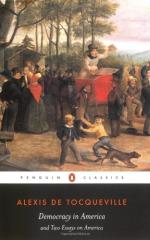
|
| Name: _________________________ | Period: ___________________ |
This test consists of 15 multiple choice questions and 5 short answer questions.
Multiple Choice Questions
1. De Tocqueville believes wars will become rarer as _______ expands.
(a) Liberty.
(b) Equality.
(c) Trade.
(d) Democracy.
2. What general attitude does de Tocqueville purport that Americans have towards each other?
(a) Distant.
(b) Friendly.
(c) Privileged.
(d) Acrimonious.
3. In America, what did people have before they had equality of conditions?
(a) Freedom.
(b) Freedom of association.
(c) Right of association.
(d) Liberty.
4. The desire for immediate gratification led the people of America to what?
(a) Slavery.
(b) Industry.
(c) Agriculture.
(d) Freedom.
5. The threat of a despotic government is greater in democratic societies because the power of the government is what, according to de Tocqueville?
(a) Unlimited.
(b) Almost unlimited.
(c) Unchecked.
(d) Absolute.
6. Limiting the right of association would be what to a democratic society?
(a) Abusive.
(b) Beneficial.
(c) Desirable.
(d) Detrimental.
7. Isolation increases the dangers of what?
(a) Absolute power.
(b) Tyranny.
(c) A dangerous leader.
(d) Mediocrity.
8. In America, de Tocqueville observes that _____________ links the aristocrat and the workman.
(a) Duty.
(b) Pride.
(c) Nothing.
(d) Tradition.
9. Civil associations are often born out of what?
(a) National political associations.
(b) Local political associations.
(c) Multi-state political associations.
(d) State-level political associations.
10. According to de Tocqueville, total equality of people's condition would only be possible in a society where freedom is what?
(a) Relative.
(b) Absolute.
(c) Liberty.
(d) Ideal.
11. Democracies tend to value what over liberty?
(a) Rights.
(b) Freedom.
(c) Political association.
(d) Equality.
12. In America, young men are given freedom when they reach what age?
(a) Adulthood.
(b) Nineteen.
(c) Teenagers.
(d) Adolescence.
13. When people are concerned about indulging their need for immediate and orderly comfort, they exercise what?
(a) Domination.
(b) Moral self-restraint.
(c) Excessive pleasure.
(d) Absolute freedom.
14. The development of industry has led to an increase in what?
(a) Working mothers.
(b) Repetitive tasks.
(c) Working poor.
(d) Division of labor.
15. Political associations bring together whom?
(a) The political elite.
(b) The feelings and opinions of men.
(c) The electorate.
(d) The feelings and opinion of the voters.
Short Answer Questions
1. According to de Tocqueville, Americans seek ______________, but only within a narrow range.
2. De Tocqueville believes that people must exercise their political freedom by what?
3. The tendency of Americans to behave differently towards outsiders is sometimes known as what?
4. Democracy counters individualism by insuring that common good is understood as what?
5. The tendency of people to implement equality first in the hope that freedom will follow is a what?
|
This section contains 411 words (approx. 2 pages at 300 words per page) |

|




